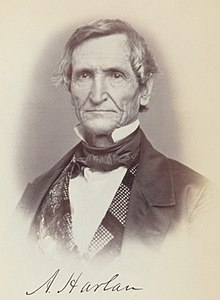Aaron Harlan
Aaron Harlan (born September 8, 1802 in Warren County , Ohio , † January 8, 1868 in San Francisco , California ) was an American politician . Between 1853 and 1859 he represented the state of Ohio in the US House of Representatives .
Career
Aaron Harlan was a cousin of Congressman Andrew J. Harlan (1815-1907) from Indiana . He attended the public schools in his home country. After a subsequent law degree and his admission as a lawyer, he began to work in Xenia in this profession from 1825 . At the same time he embarked on a political career. Between 1832 and 1833 he was a member of the Ohio House of Representatives ; in 1838, 1839 and 1849 he was a member of the State Senate . In 1841 he moved to a farm near Yellow Springs , where he continued to practice as a lawyer. In the presidential election of 1844 he was the electorate for Henry Clay . Harlan became a member of the Whig Party . In 1850 he took part in a constitutional convention of his state as a delegate.
In the congressional election of 1852 , Harlan was elected to the US House of Representatives in Washington, DC in the seventh constituency of Ohio , where he succeeded Nelson Barrere on March 4, 1853 . After two re-elections, he was able to complete three legislative terms in Congress by March 3, 1859 . These were shaped by the events leading up to the civil war . During his three legislative terms he represented three different parties. At the beginning he was still a Whigs. He then joined the short-lived Opposition Party , for which he ran in 1854. During his last tenure in Congress, he was a member of the Republican Party . In 1858 he was not re-elected.
After his tenure in the US House of Representatives, Aaron Harlan returned to working as a lawyer and in agriculture. In 1861 he competed unsuccessfully to return to Congress. In 1862 he became a lieutenant colonel in the state militia during the civil war. In 1864 he moved to San Francisco, where he died on January 8, 1868.
Remarks
- ↑ In his congressional biography, Harlan is listed as the elector of James K. Polk , but this cannot be true, since the state of Ohio was won by the Whigs in this election.
Web links
- Aaron Harlan in the Biographical Directory of the United States Congress (English)
- Aaron Harlan in the database of Find a Grave (English)
| personal data | |
|---|---|
| SURNAME | Harlan, Aaron |
| BRIEF DESCRIPTION | American politician |
| DATE OF BIRTH | September 8, 1802 |
| PLACE OF BIRTH | Warren County , Ohio |
| DATE OF DEATH | January 8, 1868 |
| Place of death | San Francisco , California |

